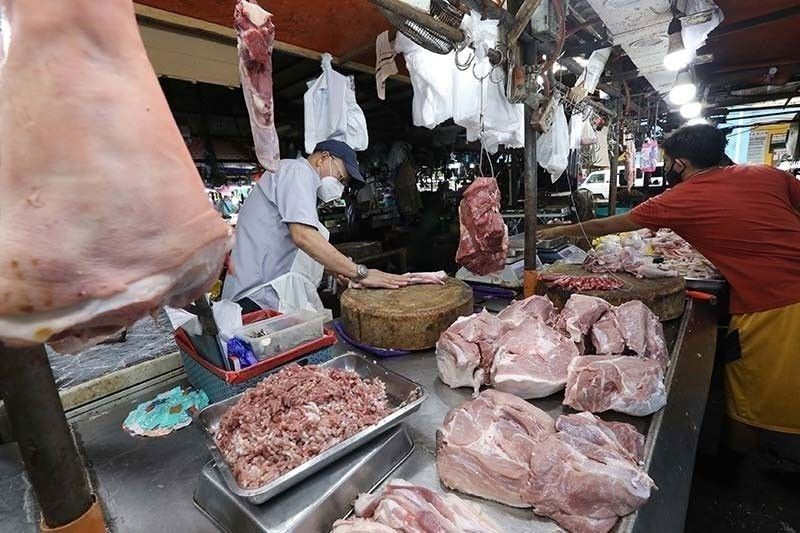Pork producers slam EO extending lower tariffs

MANILA, Philippines — A government decision to extend the lower tariffs on pork imports until the end of the year will not bring the prices of meat down, and may even push back the recovery of the country’s hog industry from African swine fever (ASF), according to the Pork Producers Federation of the Phils. Inc.
“The whole swine industry is saddened by the issuance of the new Executive Order (EO 171) by President Duterte extending low tariffs for pork imports. This will push back recovery efforts of the hog industry as it will definitely affect the sector’s confidence to reinvest for increased production output,” Pork Producers president Rolando Tambago told The STAR in a Viber message.
This sentiment was also echoed by National Federation of Hog Farmers Inc. president Chester Warren Tan who said that the new EO may discourage hog raisers to go into production.
EO 171, signed by President Duterte on May 21, extends the lower tariffs on pork under EO 134, which was signed last year, aimed at bringing down prices and stabilizing the supply of pork in the country.
EO 134 reduced the most favored nation (MFN) tariff rates for in-quota pork imports or those under the minimum access volume (MAV) to 10 percent for three months and was increased to 15 percent in the remaining months. This is lower than the original rate of 30 percent.
In contrast, out quota pork imports were slapped with a 20 percent tariff for the first three months, which were raised to 25 percent in the remaining months. This is lower than the original tariff of 40 percent.
Under EO 171, the 15 percent in-quota and 25 percent out quota tariff rates for pork will be extended until Dec. 31.
“While we understand the need for more affordable pork retail prices for the consumers, the previous EO 134, which was issued in May last year, did not deliver its promise of cheaper pork. I am confident consumers can expect the same result from this new EO. Government will lose huge potential tax revenue due to tariff cuts without tangible benefits to the consumers,” Tambago said.
Based on latest market monitors from the Department of Agriculture (DA), the prevailing price of pork ham or kasim in Metro Manila markets stood at P340 a kilo on Friday, while a kilo of pork bell or liempo was P390.
The prevailing prices are higher than the P350 per kilo price of kasim and P380 per kilo liempo exactly a year ago, based on DA data.
In a report late last year, the United States Department of Agriculture (USDA) said that while pork prices did decline in the months following the issuance of the additional MAV and lower tariffs, prices began to rise again in November.
It attributed the rise to several factors, such as the high gasoline prices, increasing demand toward the Christmas holiday season; and policies that prevented the full utilization of pork MAV and disruptive meat labeling requirements.
In March, National Economic and Development Authority (NEDA) Undersecretary Mercedita Sombilla said the additional supply that came in due to the lower tariffs and additional MAV helped bring down meat inflation and prevented prices from skyrocketing when local production was still not coming out.
“The government should instead focus on local production, with strategic actionable plans for a sustainable food supply, not import-dependent,”Tambago said.
For its part, the Philippine Association of Meat Processors Inc. (PAMPI) expressed gratitude to President Duterte for extending the reduced tariffs on pork.
“This will enable us to provide affordable prices for our pork-based products to the benefit of the consumers. We are all still recovering from the impact of the pandemic and face new challenges in the global supply chain, so the President’s move is an important step in ensuring food security during these times,” PAMPI vice president Jerome Ong told The STAR in a text message.
Apart from pork, EO 171 also extends until the end of the year the reduced tariff of 35 percent on imported rice under EO 135, which was signed last year to diversify sources amid rising global prices.
“There is a need to temporarily maintain the reduced tariffs on imported rice and pork products to attain the objectives of EOs 134 and 135, capitalize on the gains already achieved by these measures, all for the purpose of augmenting the supply of these products in the country, diversifying the country’s market sources, and maintaining affordable prices, towards ensuring food security,” the EO read.
It stressed that the conflict between Russia and Ukraine presents economic and trade implications to the Philippines, as the two countries account for 30 percent of global exports of wheat, 20 percent of corn, mineral fertilizers and natural gas, as well as 11 percent of oil exports.
“The increase in oil products, corn and fertilizers generated a corresponding sharp increase in domestic prices of basic commodities and energy, thereby resulting in upward pressures on inflation,” the EO said.
Sought for comment, Federation of Free Farmers (FFF) national manager Raul Montemayor said the extended tariffs for rice is unnecessary.
“In the case of rice, it is totally unnecessary because non-ASEAN imports have not increased significantly despite the tariff reduction and the government is just foregoing much needed tariff revenues,” Montemayor said.
He said they would ask president-elect Ferdinand Marcos Jr. to rescind the EO once he assumes office.
Moreover, EO 171 also reduces the tariffs of corn and coal imports until the end of the year.
Under the EO, corn tariffs to five percent for in-quota and 15 percent for out-quota imports, while zero tariffs are imposed for coal imports.
The EO pointed out that there is also a need to reduce the tariffs on imported corn and coal to mitigate and stabilize the impact of the inflationary pressures brought about by the Ukraine-Russia crisis, by expanding supply sources and reducing the prices of key commodities.
It noted that corn is used as a raw material in the production of animal feeds, food products, and other industrial-based products, emphasizing that it accounts for more than 50 percent of the total production cost of large-scale broiler and swine farms.
In addition, it stressed that coal is also an important raw material in the generation of electricity, as it contributes to more than half of the power generation in the country in 2020.
Philippine Maize Federation (PhilMaize) president Roger Navarro expressed hope that the reduced tariffs for corn imports would be temporary, and that the tariff collections generated would be allocated for the development of the corn sector.
“In this regard we respect the decision of the President. Further we earnestly hope that the necessary investments for corn post-harvest facilities and storage that our corn sector so badly needs for the longest time, will be realized and be put in place in the strategic corn farming areas in the country,” Navarro told The STAR in a text message.
Navarro earlier urged the government to focus on supporting and stabilizing local production instead of lowering tariff rates of corn imports, which would discourage the local industry.
“The effects of this tariff reduction will surely be felt by at least 850,000 Filipino farming families who are dependent on corn, with at least five each per family member. Easily this would account for 4.5 million Filipinos dependent on corn farming, not to mention the multiplier effect of labor involved along the corn service chain. Surely this will not inspire our Filipino people, instead will cause unhappiness, contributing to poverty and risk of peace and order in the countryside,” Navarro said in March.
In March, Socioeconomic Planning Secretary Karl Chua said the government’s economic development cluster has proposed 14 measures to alleviate the expected impact of the Ukraine-Russia war, which has caused the prices of global petroleum products to soar.
Among these proposed measures were the extension of the lower pork and rice tariffs until the end of the year, as well as the reduced tariffs on corn imports.
Apart from the reduction of tariffs on agricultural products, other efforts of the government to cushion the impact of the Russia-Ukraine crisis on the country’s food security is the implementation of the P24 billion Plant Plant Plant 2 program.
The bulk of the program’s budget or P20 billion has been allocated for fertilizer subsidies. In addition, urban and peri-urban agriculture, local feeds production, aquaculture and mariculture fisheries, and food mobilization have been allocated a budget of P1 billion each.
- Latest
- Trending


























